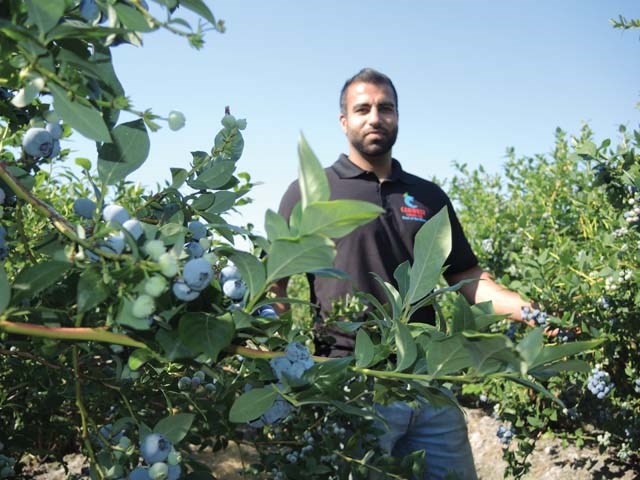Crunching over the scorched, bone-dry soil between the bush rows and peeling back some lurching branches, Humraj Kallu pulls a fist of sun-ripened blueberries in for a closer inspection.
"We're harvesting as fast as we possibly can right now, as the heat has been causing us issues these last few days," said Kallu, operations manager at Canwest Farms on Blundell and Sidaway roads in east Richmond. One of the mildest springs in recent years, coupled with a blazing June and, thus far, July, has led to farmers such as Kallu and his familyrun business rushing to get their product to market.
The mini "heatwave" looks set to abate this weekend, with showers forecast between Saturday and Tuesday.
And although many in the farming community have welcomed the relative hot spell over the last month, the rays beating down evoke mixed feelings for Kallu.
"The biggest issue we have with the heat is that the berries start to soften really quickly and get weaker," said Kallu, who's been harvesting blueberries since the mid '90s; his dad since 1979.
"That causes problems for packaging and shipping and when you start to get quality issues, the price starts to drop really quickly.
"It's definitely one of the hotter (seasons) but the heat hasn't really been a concern until the last few days. It's a race to get the product out of the field when it gets this hot. It's better to just get the berry out of the field and into cold storage."
When standing outside in that field, said Kallu, "it's even hotter than it is on the street; it's intense out there right now."
And farmers such as Kallu - whose family owns 100 acres and produces about one million pounds of crop, as well as pushing out another million pounds from its own packaging and distribution plant after buying other farmers' harvests - have to stay ahead of the game all year round, but particularly in the harvesting months. He's out in the fields every single day right now, checking the weather forecast several times a day and inspecting the crop to see if it needs to be whipped out the field.
Kallu and his family are currently in full production, with 60 pairs of hands harvesting the crop, as well as machinery working sometimes around the clock if rain is forecast.
"We've been trying to accelerate the harvest but we only have so many hands available," added Kallu.
"The bushes are still pretty loaded and there is always the possibility that you're going to lose some of the crop; but that's farming and it's still better than getting too much rain as it destroys the plant, and you can't get in there to harvest it. "There are always challenges and that, as I said, is farming."



